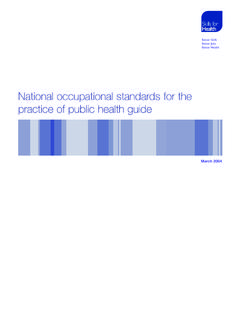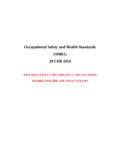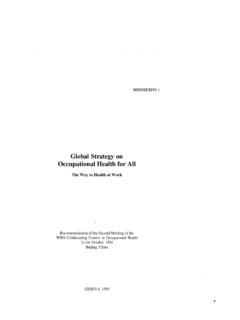Transcription of Occupational Health Service Standards for Accreditation
1 Occupational Health ServiceStandards for AccreditationIssue Date: January 2010 Review Date: By January 2015 DISCLAIMERW hile the Faculty of Occupational Medicine has taken reasonable steps to ensure that these Standards are fit for the purpose of accrediting Occupational Health services in the UK:1. this is not warranted and (to the maximum extent permitted by law) the Faculty of Occupational Medicine is not liable to a Service provider or any other person or party in the event that the Standards are not fit for the provision of Occupational Health services by the Service provider in accordance with such Standards does not guarantee that the Service provider will comply with its legal obligations to any third party in providing such Health Service Standards FOR ACCREDITATIONALL RIGHTS RESERVEDA ssessment of performance against rigorous Standards provides the drive, and warrant for Accreditation and helps to drive continuous improvement in the quality of services .
2 Standards for Better Health (2006) require a rigorous approach to assessment and Accreditation of providers of National Health Service (NHS) services . Lord Darzi s High Quality Care for All: NHS Next Stage Review (2008) confirms Government support for provider Accreditation schemes in the are expected for services that provide for the healthcare of people of working age, most of which operate outside of the NHS. Dame Carol Black s review Working for a Healthier Tomorrow (2008) advocates clear Standards of practice and formal Accreditation of all providers who support people of working age. The lack of Standards and Accreditation was highlighted consistently in responses to the call for evidence by the Faculty of Occupational Medicine, the Society of Occupational Medicine and other August 2008 the Faculty of Occupational Medicine invited stakeholders to join a working group to develop Standards and a system of voluntary Accreditation for Occupational Health services in the United Kingdom.
3 Stakeholders included representatives from Occupational medical and nursing professional bodies, commercial Occupational Health providers, employer and worker representative bodies and government departments and regulators*. Draft Standards were published on the Faculty s website on 24th June 2009 for formal consultation, inviting comments by 31st August 2009. 28 people responded to that formal consultation*. The Standards were pilot tested with 17 different providers of Occupational Health services from different sectors and of different sizes in England, Northern Ireland, Scotland and Wales*. The draft Standards were modified in light of feedback and the pilot tests. The Standards will be modified further with time as a commitment to continual improvement and to accommodate changes in professional guidance and best Standards are being introduced one year ahead of the launch of the Accreditation scheme.
4 This will permit Occupational Health services to acquaint themselves with the Standards and start to put systems in place to collect the evidence required for the Accreditation Standards and system of voluntary Accreditation for Occupational Health services aim to:(i) enable services to identify the Standards of practice to which they should aspire; (ii) credit good work being done by high quality Occupational Health services , providing independent validation that they satisfy Standards of quality; (iii) raise Standards where they need to be raised; and(iv) help purchasers differentiate Occupational Health services that attain the desired Standards from those that do measures should help to raise the overall standard of care provided by Occupational Health services in the United Kingdom, thus helping to make a meaningful difference to the Health of people of working age.
5 * See Acknowledgements Standards for Better Health : Department of Health 2006 High Quality Care for All: NHS Next Stage Review, Department of Health 2008 Working for a Healthier Tomorrow: The Stationery Office 2008 Prefacei ii Preface AimPurpose Scope Principles Introduction The Standards framework The Accreditation process The Standards and minimum requirements Domain A Business probity Domain B Information governance Domain C People Domain D Facilities and equipment Domain E Relationships with purchasers Domain F Relationships with workers References Glossary AcknowledgementsContents i 1112356710131620232627301 SEQOHSAIMThe aim of these Standards is to support the achievement of safe, appropriate and effective quality services by Occupational Health services in the United purpose of this document is to define the Standards and minimum requirements that apply to Occupational Health services that participate in the United Kingdom voluntary Accreditation scheme and to provide Occupational Health services with a framework for quality assurance.
6 SCOPEThe Standards apply to core clinical Occupational Health services services provided by doctors, nurses and Occupational Health technicians and do not apply to non-clinical services that may sometimes be provided as part of more comprehensive Occupational Health services , Occupational hygiene and Standards relate to professional activities and do not extend to an employer s legal responsibilities, which are already addressed by existing laws and regulations. However, no Occupational Health Service will be accredited if it fails to meet all applicable statutory Standards and Accreditation scheme do not obviate the need for: an Occupational Health Service to ensure compliance with all relevant legislation. a purchaser to use due diligence when selecting an Occupational Health Service .
7 It is the responsibility of a purchaser to take reasonable steps to arrange for a competent assessment of their Occupational Health needs, be that assessment performed by the contracted Service or by some independent competent adviser. It is the joint responsibility of a purchaser and the Occupational Health Service to agree, within their contract or Service level agreement, the scope of services provided. SEQOHS 2 PRINCIPLESThe Standards were developed with the following five principles in mind: OpennessThe content of the Standards will be in the public domain to ensure that providers, purchasers and workers understand the Standards that they should expect from an Occupational Health provider of Occupational Health services will be able to apply for Accreditation , in-house services in both the public and private sectors and commercial Occupational Health providers from the single-handed provider to large organisations.
8 The fees charged for assessment for Accreditation shall be affordable, realistic and proportionate to the size of the applying and minimum requirements will reflect existing ethical and professional guidance and consensus and are intended to help Occupational Health services achieve uniform good practice. ObjectivityEligibility for the award of Accreditation shall be assessed on the basis of the collection and presentation of suitable documentary evidence and on evidence should be produced as a by-product of another routine activity to avoid causing excessive administrative burden. Applicants should not have to change their own information gathering or reporting cycles to fit the Accreditation review, but should use the most recent information they have, provided it has been gathered within the last 12 months.
9 The Standards apply to single-handed practitioners where they operate directly as a commercial provider. The Standards are neither intended to apply to nor designed for single-handed practitioners where they simply provide sessional work to in-house or commercial Occupational Health services . 443 SEQOHSThe following Standards and minimum requirements are designed to be applied within a UK Accreditation scheme. They articulate the expectations of a safe, effective quality Occupational Health Service , therefore services not participating in Accreditation may also find them useful. These are professional Standards for Occupational Health services . Clinicians who deliver Occupational Health services are also bound by Standards set by their respective professional bodies in relation to their practice.
10 Many of these are listed in the list of references on page 26 of this document. Providers of Occupational Health services must, in addition to ensuring good Standards of Service delivery, be committed to supporting practice by their clinicians in accordance with the Standards set by their professional bodies. Consequently the Standards for Occupational Health services take into consideration and complement the professional Standards set by the relevant professional bodies for individual standard is something considered by an authority or by general consensus as a basis of comparison in measuring or judging adequacy or quality. These Standards have been developed by the Faculty of Occupational Medicine with other Occupational medical and nursing professional bodies, commercial Occupational Health providers, employer and worker representative bodies and government this document Standards are expressed as something which Occupational Health services must do as an overriding duty of principle in order to meet the requirements for Accreditation .













